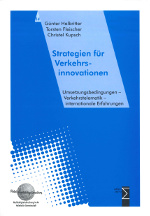Günter Halbritter, Torsten Fleischer, Christel Kupsch
Strategien für Verkehrsinnovationen
Umsetzungsbedingungen – Verkehrstelematik – internationale Erfahrungen
Berlin: edition sigma 2008, Reihe: Global zukunftsfähige Entwicklung, Bd. 14, ISBN 978-3-89404-584-5, 343 Seiten, kartoniert 22.90 Euro
[Inhalt]
[Vorwort]
[Zusammenfassung]
Abstract

Based on examples from different countries, conditions for successful innovation strategies in the transport sector, especially of the so-called "Intelligent Transportation Systems" (ITS) are identified and analysed. Of special interest was their effectiveness with regard to the criteria of "sustainable development". The factors of success are evaluated taking into account German framework conditions and regulations. Innovations defined as the deployment of new technologies in society are an ambitious organisational challenge with essential tasks for governmental institutions. The conditions for successful innovations are discussed concerning not only their general aspects but also special requirements in the field of mobility.
The investigation shows considerable differences in the legal, institutional and organisational framework conditions of the countries analysed. This implies that the governmental institutions of the different countries have played very different roles in the process of developing and deploying new techniques and services. From the beginning of the 1990s, especially in the market-oriented federal USA and in centralised Japan, governmental institutions have been engaged in transport related innovation strategies. This becomes obvious not only in fundamental political programmes but also in concrete legal initiatives as well as in various promising projects. The laws substantiate the transport related political strategy for implementing new techniques and services and require regular monitoring in the form of "national programmes" as well as the development of a "national architecture" which serves as a framework for realising and implementing the strategic objectives on the different governmental levels.
Systematic strategic approaches can also be found in different European countries. In Great Britain, a far-reaching transport related political initiative was started which comprises fiscal instruments; Austria has developed an "ITS framework plan" which includes related deployment measures. The early presentation of different organisational options for innovative concepts in the transport sector initiates an early learning process on the part of the users and can therefore become the basis for an early accompanying discourse about the design of innovations. This procedure might lead to public acceptance of new technologies and services thus representing an essential element of the often claimed "political governance".